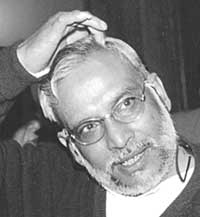 On Panchayat vs democracy
On Panchayat vs democracy They are both the same (panchayat and multi-party democracy). Have we changed the organisation at the grassroots? What is there is something that was always there. India has Panchayati Raj, Europe at the very local levels has councils of five people resolving local-level problems. The courts are for those who can afford them. Locals have always resolved their own problems in the past.
National politics
.On behalf of industrialists and businessmen we had told Girija Prasad Koirala and Madhav Kumar Nepal that a 'broad alliance' would be another form of the Panchayat. If you have a coalition government then there is no opposition. I told GP: you are a lifelong prime minister whether you are in office or not, because you have a strong organisation and can make anyone a prime minister or finance minister'. Not just Sher Bahadur Deuba or Ram Sharan Mahat, all are people brought in by him. But [I said], 'come together with Deuba for the sake of the country'.
To Madhav Nepal we said: stop doing politics in the name of the labourers and introduce the "hire and fire" system, otherwise workers will not work, but engage in strikes that cause industrial chaos and discourage investment. That would not enable economic progress.
Marwaris have been practicing real communism. Have you seen anyone in the group begging? We help everyone and make them capable of being able to earn two meals a day. Dhirubhai Ambani [the recently deceased Indian tycoon] did not have anything in 1965, but [when he died] millions came out to pay their final respects, and shareholders [in his company] even feared the value of their shares would topple. He got the respect that no politician had, even though he had many cases against him in the courts. He kept on investing and invested Rs 100 billion.
Modernity is in the economic sector. It we are able to achieve economic prosperity, even George Bush will visit us. Tony Blair and the Japanese prime minister will also visit almost every month, but no one has paid attention to economics. Finally, it was during the visit of His Majesty the King to India and China that there were agreements on water resources, tourism and trade promotion. All these show that the problems the country faces are more economic than political.
Commission agencies
.Earlier trading textiles was good business, then contracts for salt and oils. After that came grocery stores and petrol pumps. Over time, business expanded and agencies came into being. Political interference began to increase once agencies started to flourish. Then businessmen began to think that this was what politicians should be doing, not them. The minister wanted to meet the company (representative), his personal assistant wanted to meet the same person, the minister's relatives also wanted to do the same. The ministers themselves are doing the agency business. I don't mean that all HMG ministers are doing that, but in ministries like water resources, housing, telecommunications, where there is foreign aid, ministers are themselves engaged in the business. Earlier (during Panchayat days), when foreign projects came, there used to be briefings at different levels from conception until the project ended. The system vanished after democracy was introduced. Uneducated people became ministers, and bureaucrats or their relatives took advantage of their positions. How could the political leaders build their houses in Kathmandu? Any aware person knows what their situation was twelve years ago..
The future for Nepali investors
Those of us in industry are facing hard times. Those who invested in mining (Magnesite), spinning (Butwal Threads) and textiles have seen them all collapse. In this country to be successful through industry you have to steal, whether it is electricity or dodging revenue, that is the only way industry can run. Nepalis can earn only by opening assembly plants, not real industries. After Hindustan Lever came to Hetauda, all Nepali soap industries sank. If someone is earning money by re-selling raw materials imported at one percent duty, I don't have much to say. After India's Steel Authority supported one industry in Hetauda, all other steel makers sank. Why did the government not take up the issue with India? This is an important issue. They imposed anti-dumping duties and quotas, saying we were selling more copper wires, and they seem to get away [doing the same] by using political pressure.


